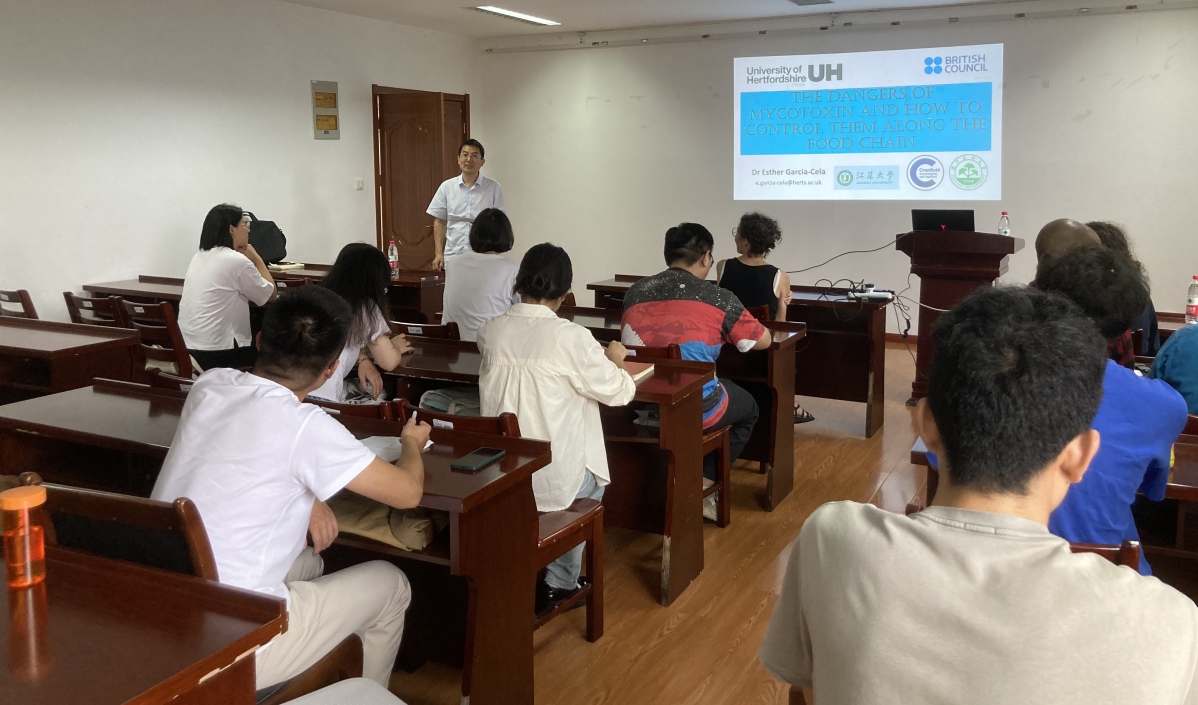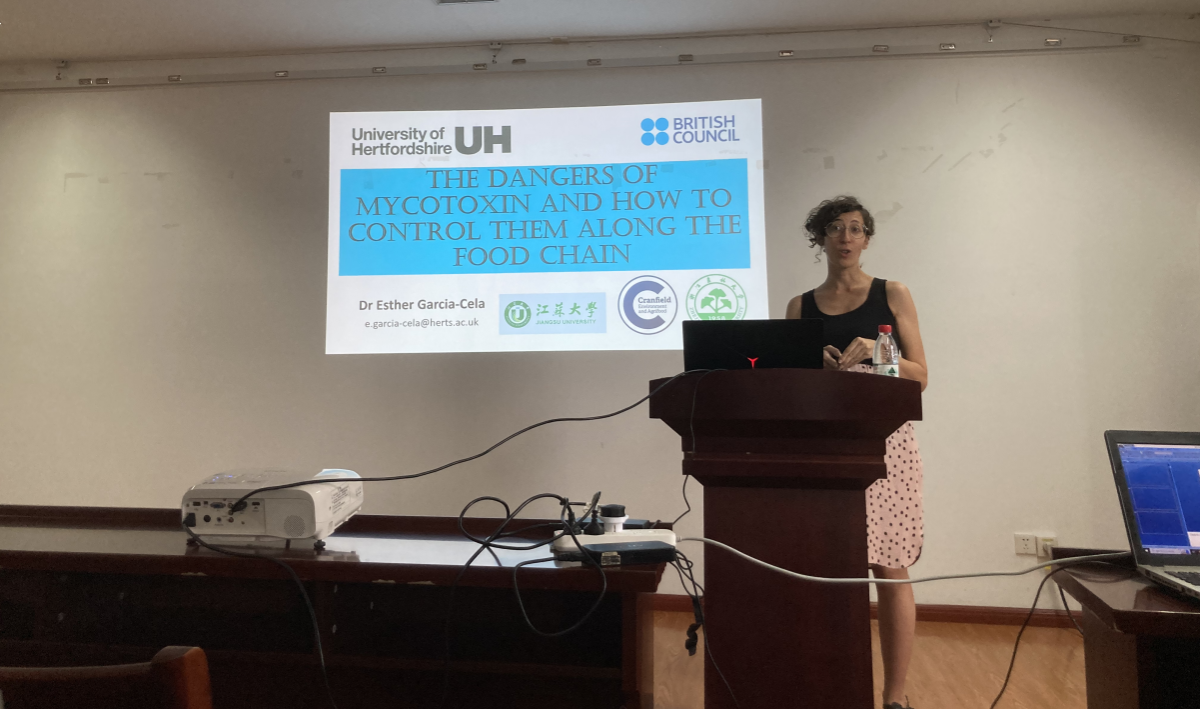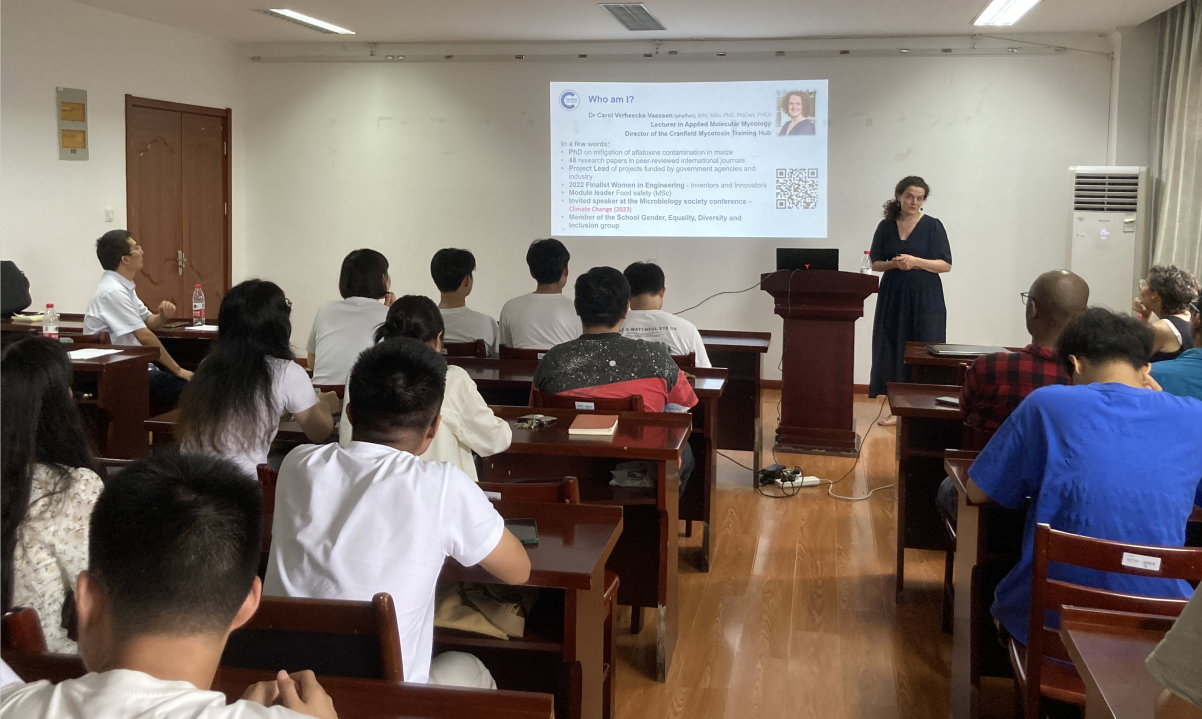On Sep. 19, 2023, Dr. Carol Verheecke-Vaessen Director of the Centre for Mycotoxin Training at the University of Cranfield, and Dr. Maria Esther Garcia-Cela, lecturer of applied mycology at University of Hertfordshire, gave lectures at Jiangsu University.
At the lecture and discussions took more than two hours, Prof. Cunshan Zhou, the associate dean of the School of Food and Biological Engineering welcomed the two guests. He gave a brief introduction about the two scholars, outlining their curriculum vitae and major academic achievements.

More than 60 Sino-foreign faculty members and students of the school attended the lectures. The first presentation was given by Dr. Maria Esther Garcia-Cela on the theme of “The danger of mycotoxin and how to control them along the food chain”.
Dr. Maria started her presentation with a brief introduction of herself. She obtained a Ph.D. degree in Agricultural and Food Science and Technology in 2014 from the University of Lleida, Spain. Currently, she is working on different strategies to reduce mycotoxins in the human and animal food chains. Her work has focused on the impact of climatic conditions and prediction. In Italy, she examined Aspergillus flavus to minimize aflatoxin contamination of corn. In 2016, she developed predictive microbiology models of mycotoxigenic fungi and created decision support systems to improve the storage capacity of major cereals and nuts at Cranfield University (UK). In 2019, Dr Garcia-Cela joined the University of Hertfordshire as a Senior Lecturer in Applied Mycology.Summary of the presentation
Plant-based lifestyles have developed considerably in recent years. However, a plant-based diet can increase exposure to chemical contaminants such as mycotoxins. Thus, vegetarians, vegans and flexitarians constitute a high-risk group due to their high consumption of foodstuffs likely to contain mycotoxins. More formulation of exposure assessments needs to be carried out on an ongoing basis, and it is important to take account of the different groups for improved estimation of risk. Primarily, a wider range of plant-based foods needs to be studied in order to assess mycotoxin exposure in detail worldwide. Therefore, control of mycotoxins in the industrial food sector by developing relevant models correlated with environmental conditions is very important.

The second presentation was given by Dr. Carol Verheecke-Vaessen on the theme of “Mycotoxins and Climate Change: How to Predict Risks and Develop Resilient Solutions”.
Dr. Carol opened by introducing herself. In brief, she obtained her Ph.D. in 2014 on mitigation of aflatoxin in maize. She conducted important projects funded by government agencies and industries. In 2022 she was finalist of women in engineering – inventors and innovators. She is a leader of Module Food Safety (Msc) at Cranfield University and member of the School Gender, equality diversity and inclusion group. Dr. Carol has published over 40 research papers in peer-reviewed journals and 4 book chapters. In 2021, Dr. Carol became director of the Mycotoxin Training Hub, responsible for developing bespoke training and research opportunities to address the specific mycotoxin challenges facing the food and drink industry in the UK and worldwide.
Summary of her presentation
In her presentation, Dr. Carol presented some important facts and references on how climate change can impact food contamination, and suggested the situation will even worse if nothing is done to improve food control and safety. More predictive studies and collaboration between countries and international food safety agencies should help limit this trend. In particular, she highlighted Cranfield University's platform for simulating climate change and studying the impact of climate change on mycotoxins. Finally, she discussed research findings correlating changes in the molecular mechanisms involved in mycotoxin production with an increase in CO2, temperature or humidity in the environment.

Overall, this visit should foster collaboration and academic exchange between China and the UK to develop a more complete food chain and improve food compliance with mycotoxin regulations.